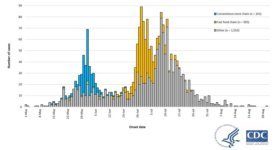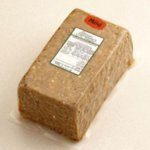CDC reports that this summer (May–August 2018) the total number of laboratory-confirmed domestically acquired cyclosporiasis (as of October 1, 2018) was 2,299. At least 160 people were hospitalized; no deaths were reported. The number of people that became sick with cyclosporiasis is significantly higher than the numbers of cases reported for the same period in 2016 and 2017. Several large outbreaks were reported during this period. Roughly one-third of ill people were associated with two large outbreaks :(i) An outbreak linked to prepackaged vegetable trays (containing broccoli, cauliflower, and carrots) sold at a convenience store chain, and produced by Del Monte. (ii) An outbreak linked to salads (containing carrots, romaine, spinach, kale, and varietal red leaf lettuce) sold at McDonalds and produced by Fresh Express. Some of the increase can be ascribed to the increased use of a multiplex molecular assay to examine stool specimens. Other types of fresh produce contributed cases. Two basil-associated clusters of eight confirmed cases each were identified. Multiple cilantro-associated clusters were identified. The lack of validated molecular typing tools for Cyclospora prevented linking more cases to particular products. @ https://www.cdc.gov/parasites/cyclosporiasis/outbreaks/2018/c-082318/index.html
ruth
CDC and federal, state, and local public health partners are investigating an increase in reported cases of Cyclospora infection (cyclosporiasis). Reports of cases tend to increase during summer months in the United States.
ruth
The FDA announced that BazziniI LLC (Allentown, PA) recalled 4,000 pounds of Roasted and Salted Colossal Natural, Super Colossal Natural and Rams Head Natural In-Shell Pistachios received from one of its suppliers because it has the potential to be contaminated with Salmonella. No illnesses have been reported to date. The affected product was distributed through retail sale, direct delivery, and mail order in New York, New Jersey, Vermont, Massachusetts, Washington DC, and Virginia. A routine sampling program by the company revealed that the finished product may contain Salmonella. The company has ceased production and distribution of the products.@ https://www.fda.gov/Safety/Recalls/ucm622867.htm?utm_campaign=Bazzini%20LLC%20Recalls%20Certain%20Pistachio%20Products%20Because%20of%20Possible%20Health%20Risk&utm_medium=email&utm_source=Eloqua
BazziniI LLC of Allentown, PA out of an abundance of caution, is recalling 4,000 pounds of Roasted and Salted Colossal Natural, Super Colossal Natural and Rams Head Natural in Shell Pistachios received from one of its suppliers because it has the potential to be contaminated with Salmonella. NO OTHER BAZZINI PISTACHIOS OR BAZZINI PRODUCTS ARE IMPACTED OR PART OF THIS RECALL. The recall is being initiated voluntarily and no illnesses have been reported to date.
ruth
The U.S. Department of Agriculture’s Food Safety and Inspection Service (FSIS) announced that Malone’s Fine Sausage Inc (Milwaukee, WI) recalled approximately 26,323 pounds of ready-to-eat pork head cheese product that may be contaminated with Listeria monocytogenes. The ready-to-eat pork head cheese items were produced from Aug. 27, 2018, through Oct. 5, 2018. The problem was discovered on Oct. 9, 2018, by FSIS inspection program personnel while verifying the disposition of product that FSIS tested positive for Listeria monocytogenes. There have been no confirmed reports of adverse reactions due to consumption of these products @ https://www.fsis.usda.gov/wps/portal/fsis/topics/recalls-and-public-health-alerts/recall-case-archive/archive/2018/recall-088-2018-release
Malone’s Fine Sausage Inc., a Milwaukee, Wis. establishment, is recalling approximately 26,323 pounds of ready-to-eat pork head cheese product that may be adulterated with Listeria monocytogenes.
ruth
Short- wavelength ultraviolet (UVC) light is used extensively to kill or inactivate microorganisms. By 2020 the use of use of low-pressure mercury lamps will be discontinued and a new source of UV will be required. As a result, UV light-emitting diode (UV-LED) is being investigated as an alternative. An optical chopper system that physically divides the light with an adjustable blade, with adjustable frequency and duty ratio settings, was introduced for generation of pulsed UVC-LED irradiation. In the study, the enhanced bactericidal effect of a pulsed UVC-LED system, compared to continuous irradiation, and optimum conditions for maximizing the effect were determined. The combination of 20-Hz frequency and 50% duty ratio for pulsed UVC-LED irradiation achieved 4- to 5-log-unit reductions of Escherichia coli O157:H7, Salmonella enterica serovar Typhimurium, and Listeria monocytogenes. @ https://aem.asm.org/content/84/20/e01340-18
UVC light, a strong surface disinfection technology, is used worldwide to ensure not only environmental safety but also food safety. Several drawbacks associated with the use of mercury-containing UV lamps, especially human and environmental health risks, led to the Minamata Convention on Mercury, which prohibits the manufacture and import/export of products containing mercury. Therefore, light-emitting diode (LED)-based UVC irradiation, a new technology that is ecofriendly and represents an effective UV light source, has been researched recently. To date, however, there has been no report describing pulsed UVC-LED irradiation for improvement of inactivation of foodborne pathogens, although much research regarding conventional pulsed xenon lamps has been published. In this investigation, we evaluated the enhanced bactericidal effect of a pulsed UVC-LED system, compared to continuous irradiation, and optimum conditions for maximizing the effect were determined. Also, the differences in inactivation between pulsed and continuous UVC-LED irradiation were determined by inactivation mechanism analyses. The combination of 20-Hz frequency and 50% duty ratio for pulsed UVC-LED irradiation achieved 4- to 5-log-unit reductions of Escherichia coli O157:H7, Salmonella enterica serovar Typhimurium, and Listeria monocytogenes; this combination showed the greatest bactericidal effect among various treatment conditions using 2 or 5 mJ/cm2. In mechanism assessments, membrane integrity (propidium iodide uptake) was not affected by UVC-LED treatment but membrane potential [bis-(1,3-dibutylbarbituric acid)trimethine oxonol [DiBAC4(3)] accumulation] showed significantly different values when pulsed and continuous treatments were compared. Changes in membrane lipid peroxidation and respiratory enzyme activity were attributed to generation of more reactive oxygen species by pulsed UVC-LED irradiation.
IMPORTANCE In 2013, the United Nations Environment Programme convened the Minamata Convention on Mercury, which prohibits trade in mercury-containing products in order to ensure human health. It will be effectuated in 2020; use of low-pressure mercury lamps will be discontinued and a new UV light source selected to replace the conventional technology. In this regard, UVC-LEDs have been developed and the fundamental inactivating effect has been researched. However, a pulsed UVC-LED system has not been studied, because of the difficulty of generating a UVC-LED pulse wave. An optical chopper system that physically divides the light with an adjustable blade, with personalized frequency and duty ratio settings, was introduced for generation of pulsed UVC-LED irradiation. This study elucidated the efficacy of a pulsed UVC-LED system and investigated its enhanced bactericidal effect in mechanism analyses.



